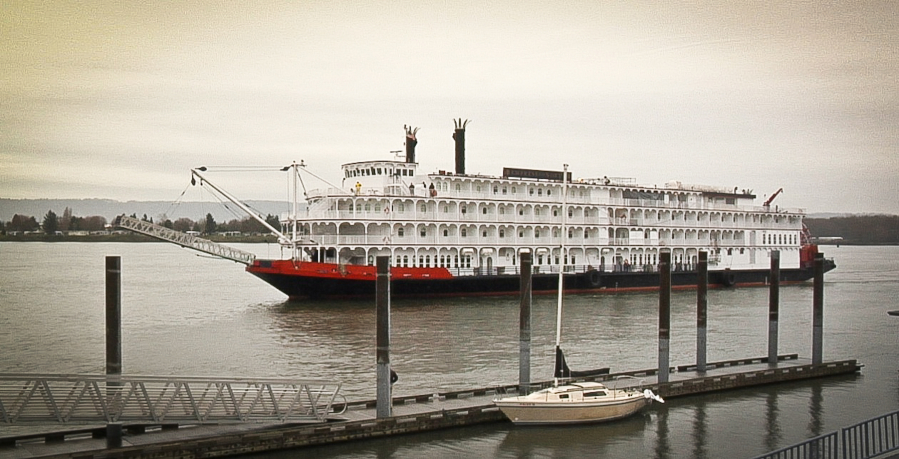Commuters hoping that a new Interstate 5 Bridge will save them from traffic congestion are likely to be waiting a long time, but a new Portland-based nonprofit is pitching an alternative commuting idea that it says could be up and running in a much shorter timeframe: a Portland-to-Vancouver ferry service.
The nonprofit group, which calls itself Friends of Frog Ferry, unveiled the concept last week and hosted a press conference Tuesday to lay out some of the details. The ferry is envisioned to run between Vancouver’s Terminal 1 and Portland’s Salmon Street Spring dock, serving commuters and tourists.
Lead organizer Susan Bladholm made one thing very clear: the proposed ferry is intended to complement a future replacement of the Interstate 5 Bridge, which the group says it also supports. The ferry wouldn’t solve congestion on its own, Bladholm said, but it would make a dent — and supporters believe the service could launch as early as 2022.
“We don’t believe this is an either/or conversation,” she said.
Portland Mayor Ted Wheeler publicly expressed interest in the ferry idea on Twitter last week, and his chief of staff, Michael Cox, announced at the press conference that the city would be willing to “lead a conversation” with other jurisdictions to try to come up with the necessary funding for the study.
The project also has the support — or at least the interest — of a number of agencies on the north side of the Columbia River, including the city of Vancouver, the Port of Vancouver, the Columbia River Economic Development Council and C-Tran.
“It’s an interesting idea, but it seems like it’s still at the idea stage,” said Chad Eiken, Vancouver’s economic development director. “So although we’re supportive, we want to see more information.”
C-Tran spokeswoman Christine Selk said it’s too early for the agency to take an official position about the project, but called it exciting and said the agency would be happy to take part in future discussions.
Port of Vancouver Economic Development Project Manager Jim Hagar attended the press conference to express support for further study of the idea. The port is interested in the project as a way to better use the river for transportation, he said, although it’s currently not offering any financial support.
“We’re not there yet,” he said.
The dock at Terminal 1 is scheduled to be torn down and rebuilt as part of the port’s overall redevelopment of the site, Hagar noted. The port hopes to have to have the $25 million dock project finished by 2025, he said, although that schedule is dependent on how the rest of the Terminal 1 project progresses over the next five to 10 years.
The timing is both a challenge and an opportunity, he said; if the ferry service takes off, the new dock could be built to better accommodate it. But it also means that the dock might be under construction right when the ferry service needs it to get started — and there aren’t many other docking options.
“In terms of downtown Vancouver, (Terminal 1) would be about the only place they could dock,” he said.
Developing the service
Ferry service was previously examined in a 2006 study commissioned by the Portland Bureau of Transportation, which estimated that a single 100-person vessel would cost $3.4 million per year to operate, requiring a public subsidy.
The study concluded that a ferry service was too expensive for the city to pursue at the time, and would only become viable if the city’s population and road congestion increased to a level that would give the ferry a speed advantage.
The Portland region has now reached that threshold, Bladholm argued, and the city’s lack of any sort of ferry or water taxi service makes it an outlier among other major cities with water access such as Seattle, San Francisco and Vancouver, B.C.
“If all these other river cities can do it, why can’t we?” she asked.
The Friends group is currently trying to get support from additional regional governing agencies such as Metro in order to fund a set of five feasibility studies for the project, at a cost of $650,000. The group is prepared to abandon the ferry idea if the studies don’t bear it out, Bladholm said. If the study results are positive, the next step would be the development of a full financial plan, which the group estimates would cost another $650,000.
The studies would fill in a lot of missing details about the proposed service, including the type and configuration of vessel, the likely cost per trip for individual riders and the issue of how riders will get to and from the docks.
But Bladholm and other backers say they have a rough plan for what the service could look like.
The service would be a public-private partnership, and would travel on the Columbia and Willamette rivers between Terminal 1 and downtown Portland. It would be passenger-only, with no cars, in order to help encourage walkability and reduce congestion.
A trip from Vancouver to Portland would take an estimated 38 minutes, Bladholm said. For comparison, TriMet estimates that it takes 36 minutes for MAX trains to travel from the north end of the Yellow Line to Portland State University downtown — although that’s starting from the Portland Expo Center rather than Vancouver.
Bladholm said she envisions the service launching with three vessels, using two in active operation along the route. If the first phase is successful, she said, the next step would be to add more boats and up to eight stops along the route, and eventually consider expanding the route farther up the Willamette River to reach places like Lake Oswego and West Linn.
Portland’s many bridges would be one of the biggest logistical hurdles, because a river service would need to avoid any bridge lifts in order to maintain its schedule, Bladholm said. The Steel Bridge in particular offers very little clearance for river traffic without raising its lower deck.
“It is possible to design a vessel that will not require the Steel Bridge to lift,” said Dan Yates, owner of the Portland Spirit and an enthusiastic supporter of the ferry project. The ferry would likely need to be only one story tall in order to clear the bridge, he added.




